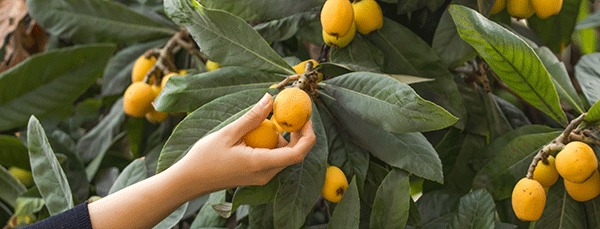Not only do I love making medicines from my own garden but I also appreciate clients being able to obtain homegrown medicines, too. I’ll never forget one case where a woman was having nausea along with tremendous problems breathing with lots of white mucus in her lungs. She lived quite a distance away and so couldn’t quickly get to the clinic. As she had a small farm and big garden, I knew she grew lots of plants. I asked if she had a loquat tree and she did. I told her how to make a tea of the leaves and after she drank the first cup, her breathing immediately opened and her lungs soon cleared. Loquat is readily found in cough syrups in Chinese pharmacies as well as in many health food stores so you are probably already familiar with this herb, if not the fruit. If you are fortunate to have one of these trees in your yard or nearby, make some syrup yourself or dry the leaves to have on hand when needed. One of the best aspects of loquat is that it is not only quite effective for coughs, especially those with abundant mucus, but it also has a neutral energy. This means it treats both white and yellow mucus conditions. Further, it is good for those with either excess (fullness) and deficiency (weakness). This makes loquat incredibly versatile for all kinds of coughs with abundant mucus. As well, loquat is useful for nausea, vomiting, hiccough, and belching. In these cases, dampness or mucus is generally trapped in the stomach, causing those digestive problems (which can further lead to mucus in the lungs, appearing as coughs or constant need to clear the throat without an acute cold or flu condition). It also stops nosebleeds and spitting or coughing up of blood. In all these cases, loquat works not only through expectoration but also by “directing the Qi downward.” This loosely indicates that it is bringing things that are going up, back down. When you use loquat leaves, know that they should first be dried and then the fuzzy hair under the leaf rubbed off. Otherwise, these can irritate the throat. The hydrocyanic acid content of loquat is not concentrated in the leaf, so this herb does not require the same caution as other hydrocyanic acid-containing herbs (such as wild cherry bark and apricot seed). Do NOT use loquat seeds as they are slightly poisonous.
Loquat Leaf (Eriobotrya japonica) Pi pa ye (Chinese) Family: Rosaceae Also named: Eriobtrya, Eriobotryae Folium Energy and flavors: Neutral, bitter Organs and channels affected: Lung, Stomach Chemical constituents: Saponins, amygdalin, hydrocyanic acid Properties and actions: Antitussive, expectorant; transforms Phlegm and stops coughing and wheezing, directs Qi downwards, stops bleeding Contraindications: Caution in Cold conditions Dosage: 6-15g; 30-60 drops tincture (1:5 @50%ABV), TID

